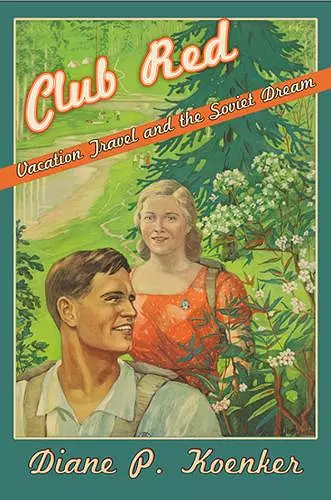Club Red
Vacation Travel and the Soviet Dream
Format:Hardback
Publisher:Cornell University Press
Published:24th Apr '13
Currently unavailable, and unfortunately no date known when it will be back
This hardback is available in another edition too:
- Paperback£27.99(9781501710674)

The Bolsheviks took power in Russia 1917 armed with an ideology centered on the power of the worker. From the beginning, however, Soviet leaders also realized the need for rest and leisure within the new proletarian society and over subsequent decades struggled to reconcile the concept of leisure with the doctrine of communism, addressing such fundamental concerns as what the purpose of leisure should be in a workers' state and how socialist vacations should differ from those enjoyed by the capitalist bourgeoisie.In Club Red, Diane P. Koenker offers a sweeping and insightful history of Soviet vacationing and tourism from the Revolution through perestroika. She shows that from the outset, the regime insisted that the value of tourism and vacation time was strictly utilitarian. Throughout the 1920s and '30s, the emphasis was on providing the workers access to the "repair shops" of the nation's sanatoria or to the invigorating journeys by foot, bicycle, skis, or horseback that were the stuff of "proletarian tourism." Both the sedentary vacation and tourism were part of the regime’s effort to transform the poor and often illiterate citizenry into new Soviet men and women.Koenker emphasizes a distinctive blend of purpose and pleasure in Soviet vacation policy and practice and explores a fundamental paradox: a state committed to the idea of the collective found itself promoting a vacation policy that increasingly encouraged and then had to respond to individual autonomy and selfhood. The history of Soviet tourism and vacations tells a story of freely chosen mobility that was enabled and subsidized by the state. While Koenker focuses primarily on Soviet domestic vacation travel, she also notes the decisive impact of travel abroad (mostly to other socialist countries), which shaped new worldviews, created new consumer desires, and transformed Soviet vacation practices.
Club Red, Diane Koenker's excellent new book on Soviet vacation travel, adds to a countercurrent that has gathered force in the past few years. Viewed from the perspective of vacations—or, in other recent works, of automobiles, moviegoing, television, or circuses—the divisions between the NEP, Stalin, and especially Khrushchev, Brezhnev, and Gorbachev periods often seem less sharp than we had previously imagined. Without ignoring repression, works in this vein elucidate aspects of normal Soviet life that previous scholarship had tended to obscure.
-- Julie Hessler * The Journal of Modern History *In the early years of the Soviet era, vigorous outdoor activity held sway as a restorative and as a repudiation of the pleasure-filled, hotel-bound vacations favored in the West. Gradually, the regime made room for health sanatoriums and vacation travel, although still guided by 'scientifically planned and purposeful activities.' Ironically, these changes began in 1927, on the eve of Stalin's brutal collectivization of agriculture and first five-year plans. Koenker, with discriminating thoroughness, traces the evolution of Soviet vacationing from that point through the mid-1980s.... This is well-told history, a portrait of life in the Soviet Union that will be recognizable to those who lived it.
-- Robert Legvold * Foreign Affairs *This solidly researched history of tourism concerns rest and recreation for the masses as well as outings by more privileged groups.... The book should interest historians and social scientists of the Soviet Unionas well as specialists of tourism elsewhere since she compares Soviet programs with Western tourism.
-- Jeffery Brookes * The Journal of Interdisciplinary History *While adding a fresh perspective to the already rather extensive literature on Stalinist consumption, Koenker's work breaks substantial new ground in this account of late socialism and its reforms of consumption and consumerism, on which only a tiny number of archive-based studies yet exist. It also lays a foundation for scholars to investigate this important aspect of the Soviet experience from other perspectives and using other methodologies, including oral history... this ambitious, wide-ranging but still remarkably rigorous study will be of relevance and value to scholars of every period of Soviet history.
-- Polly Jones * Slavic Review *Prodigiously researched and expertly written by a pioneering scholar of Soviet tourism, Club Red expands the analytical frameworks of Koenker’s earlier work, particularly her 2006 volume co-edited with Anne E. Gorsuch, Turizm: The Russian and East European Tourist under Capitalism and Socialism.
-- Olga Mesropova and Thomas Waldemer * Slavic and East European Journal *[Readers] will be rewarded by seeing Soviet society from a unique and valuable vantage point. Koenker is to be commended for bringing this story to light and to life.
* The American Historical Review *Koenker's extremely well researched and well-written book traces the two kinds of vacations (health resorts and tourism) through time and demonstrates how the Soviet state sought to construct a unique socialist leisure regime to benefit the proletariat.... This book will be of great interest to specialists in Soviet history and in the history of travel and tourism.
* History *Club Red already provides readers with so much. It does an excellent job describing and analyzing the changing institutional leadership of and cultural and social meanings associated with spa and rest home vacations.... It provides important insights into the contradictions and tensions in the Soviet vacation system. It effectively situates vacations in the "socialist" consumer culture that began to emerge in the 1930s and burgeoned in the 1960s, as well as in the broader Soviet experiment. This extremely well-researched and fascinating book will be of value to many scholars, particularly those interested in consumer culture, vacations and tourism, and the Soviet Union.
* Business History ReviISBN: 9780801451539
Dimensions: 235mm x 155mm x 25mm
Weight: 907g
328 pages